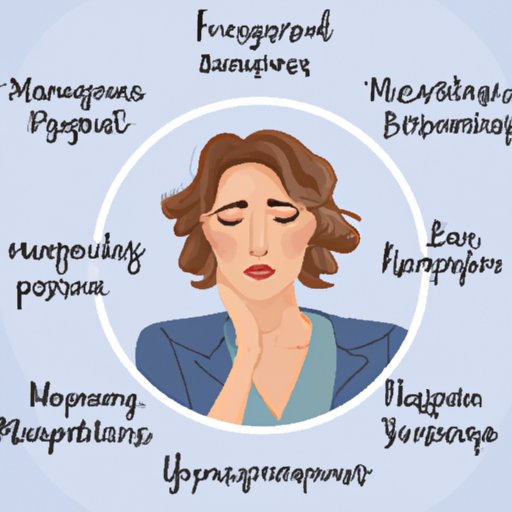
Does Menopause Make You Tired?
Menopause is a natural biological process that marks the end of a woman’s menstruation cycle. It usually occurs between the ages of 45 and 55, and is characterized by a range of physical and emotional symptoms. One of the most common physical symptoms of menopause is fatigue. Menopausal fatigue is often a silent yet frustrating symptom that can take a toll on women’s overall well-being. Understanding the causes and exploring remedies can help manage this symptom more effectively.
The Physical Symptoms of Menopause: Fatigue
Menopausal fatigue is a physical symptom that many women experience during menopause. It is a feeling of tiredness, weakness, and decreased energy levels that affects women’s ability to perform daily activities. Menopausal fatigue can also interfere with sleep quality, resulting in a vicious cycle of fatigue and sleep disturbances. Other physical symptoms that can contribute to fatigue during menopause include hot flashes, night sweats, and joint/muscle pain.
How to Manage Menopausal Fatigue: Tips and Remedies
Managing menopausal fatigue can be challenging, but there are lifestyle changes that women can make to reduce its impact. Firstly, regular exercise can boost energy levels and help improve sleep quality. A healthy diet, rich in fruits, vegetables, and whole grains, can also contribute to an overall sense of well-being. Stress management, such as yoga, meditation, or deep breathing, can help women cope with the psychosocial symptoms of menopause.
In addition to lifestyle changes, there are several natural remedies that may help manage menopausal fatigue. Herbal supplements such as black cohosh and ginseng have been shown to be helpful in some women. Essential oils, such as lavender, can also promote relaxation and improve sleep quality. Medical treatments, such as hormone therapy and antidepressants, can also be effective for managing menopausal fatigue. However, it’s essential to discuss the risks and benefits of these treatments with a healthcare provider before starting any new therapy.
Understanding the Connection Between Menopause and Tiredness
The hormonal changes that occur during menopause are often the root cause of menopausal fatigue. Changes in estrogen and progesterone levels can affect sleep patterns and reduce energy. Additionally, sleep disturbances, such as insomnia or sleep apnea, can also occur during menopause, further exacerbating fatigue. Mood changes, such as depression or anxiety, can also be a contributing factor in menopausal fatigue.
It’s crucial to seek medical advice if fatigue interferes with daily life. A healthcare provider can rule out any underlying medical conditions, such as anemia or thyroid disorders, that may cause fatigue. They can also recommend appropriate treatment options, whether that’s medication or lifestyle changes.
Menopause Fatigue: Causes and Treatment Options
There are several causes of menopausal fatigue, and the treatment approach may vary depending on the underlying causes. Hormonal imbalances due to menopause are the most common cause of fatigue in this stage of life. Hormone therapy, or replacement therapy, can be an effective treatment option for women whose fatigue is due to hormonal imbalances. Lifestyle changes such as regular exercise, healthy diet, and stress reduction techniques can also help mitigate the impact of hormonal changes during menopause.
Other causes of menopausal fatigue include hot flashes, which can disrupt sleep and lead to fatigue, as well as stress and depression. Therapy or counseling may be beneficial for women experiencing psychosocial symptoms that contribute to fatigue. Antidepressants can also be an effective treatment option for some women experiencing menopausal-related depression or anxiety. Healthcare providers may recommend a combination of therapies to manage fatigue more effectively.
How Lack of Sleep Contributes to Menopausal Fatigue and What to Do About It
Lack of sleep is one of the main contributors to menopausal fatigue. Sleep disturbances, such as hot flashes and night sweats, can interrupt sleep and cause women to wake up feeling tired. Poor sleep quality can also impact energy levels and contribute to daytime fatigue. Improving sleep hygiene habits, such as avoiding electronics before bedtime and setting a regular sleep schedule, can help improve sleep quality during menopause. Relaxation techniques, such as meditation or deep breathing exercises, can also help women unwind before bedtime.
In some cases, healthcare providers may recommend natural sleep aids, such as melatonin supplements or chamomile tea. Other prescription sleep aids may also be prescribed, although women should discuss the risks and benefits of these medications first with their healthcare provider.

Coping with Menopausal Fatigue: Practical Solutions
There are several practical solutions that women can use to manage menopausal fatigue during daily life. Firstly, scheduling dedicated rest periods throughout the day can help women conserve energy and recharge. Women should also consider reducing their workload, where possible, to reduce stress and fatigue. Staying hydrated can also help boost energy levels and combat fatigue. Self-care activities, such as getting a massage or taking a relaxing bath, can also help women feel refreshed and rejuvenated.
Finally, stress reduction is critical for managing menopausal fatigue. Women should consider taking up activities that promote relaxation and reduce stress, such as yoga, meditation, or journaling. Support from friends, family, or colleagues can also help women cope with the challenges of menopause.
Lifestyle Changes to Overcome Menopausal Fatigue
Lifestyle changes can be a powerful tool for overcoming menopausal fatigue. Maintaining a healthy diet rich in fruits and vegetables can provide essential nutrients to support overall health. Additionally, quitting smoking and reducing alcohol intake can improve energy levels and help manage menopausal symptoms. Regular exercise, even a low-intensity activity such as walking, can also boost energy and improve sleep quality.
Finally, seeking support from healthcare professionals and support groups can provide women with valuable resources and information on managing menopausal fatigue and other symptoms effectively.
Conclusion
Menopausal fatigue is a common physical symptom that can impact women’s overall well-being during menopause. Understanding the causes and exploring remedies can help manage this symptom more effectively. Lifestyle changes, natural remedies, and medical treatments can all be effective solutions to manage menopausal fatigue. Seeking support from healthcare professionals and support groups can also provide women with the resources and information they need to navigate this transition successfully.




